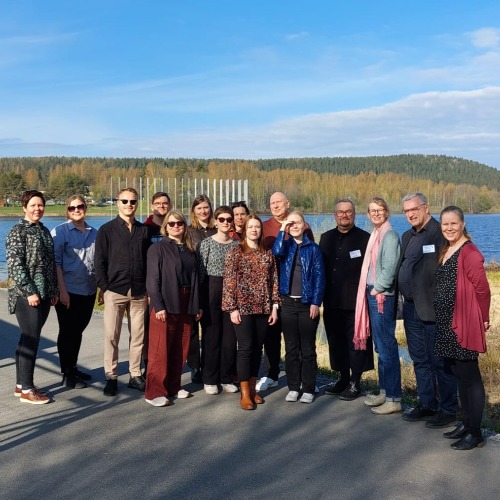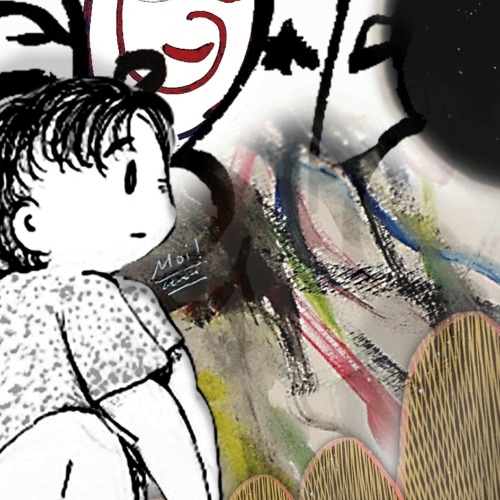
Social Psychology Research and Education Team
Our Research Themes
This page brings together research conducted within the discipline of social psychology at the University of Eastern Finland. Our research covers a wide range of social psychological topics such as the relationship between individuals and communities, the promotion of well-being, social interaction, group processes, and the construction of social meanings in everyday life. Our research connects individual experiences with broader social and societal processes. We have expertise in a broad range of qualitative and quantitative methods. Our research focuses on the following interrelated themes: Life Course Social Psychology, Social Psychology of Well-being, Social Psychology of Intergroup Relations, Social Psychology of Working Life, Visual Social Psychology, and Environmental Social Psychology.
Life Course Social Psychology
This theme is based on the understanding that life stages are socially and culturally constructed, historically changing, and intertwined with individual development. We examine the significance of social and cultural factors in individuals’ life courses, focusing on transitions and turning points such as emerging adulthood, migration, and suffering related to loss. For example, we study the transition to adulthood among working-class youth.
Social Psychology of Health and Well-being
Social relationships are critical for promoting and maintaining well-being and mental health. Social psychological research on well-being provides knowledge and tools to strengthen social skills and communities. We explore this theme through identities, interaction, and intra-group processes in contexts such as healthcare, integration, intergenerational relationships, working life, and educational institutions. For instance, we examine how decision-making processes and participation are shaped in various social and health service encounters.
Social Psychology of Intergroup Relations
With global forced displacement and migration, societies are becoming increasingly multicultural. Therefore, functional intercultural group relations and smooth everyday encounters are more important than ever. We study intercultural friendships and their development, the significance of place in group relations, and the perceptions and experiences of foreign-background and Finnish youth. We also examine encounters between mothers of young children from different cultural backgrounds in their residential areas.
Social Psychology of Working Life
Work is a central part of everyday life and significantly affects well-being. Changes in working life—such as digitalization, diverse work communities, and the reorganization of work—challenge traditional structures and require new understanding of social processes related to work. In this theme, we examine phenomena in working life from the perspectives of social relationships and interaction, emphasizing community, meaning-making, and group dynamics. We study workplace bullying, team leadership, stakeholder collaboration, and professional practices in helping professions. For example, we explore the reorganization of collaboration in health research and leadership in physically demanding environments.
Visual Social Psychology
Visual communication has expanded dramatically and is now accessible to everyone. This makes it essential to understand images as a form of social interaction. In this area of research, we examine how meanings, identities, and social realities are constructed and transformed through photographs and other visual media. We study, for example, how media images shape the refugee experience, how national visual symbols gain new meanings over time, and how power operates through visual representation. We also cover art-based and other visual research methods.
Environmental Social Psychology
While social psychology traditionally centers on social relationships, growing attention is being paid to their entanglement with the material and physical environment. Rapid environmental changes require adaptation to new conditions, which also affect social processes. In this theme, we explore how nature and built environments—and the meanings attributed to them—are reflected in intra-group processes, intergroup relations, and individual well-being. We study, for instance, how the material environment can promote or hinder experiences of belonging or exclusion in multicultural communities, and how indoor air problems shape psychosocial well-being and group processes.
Projects
-
 Mamanet Finished 01.08.2018 - 31.12.2025
Mamanet Finished 01.08.2018 - 31.12.2025 -
 Intergroup relations and local encounters – Immigrant and Finnish young people’s perceptions of each other, their lives and future in multicultural Savo 01.01.2023 - 31.12.2026
Intergroup relations and local encounters – Immigrant and Finnish young people’s perceptions of each other, their lives and future in multicultural Savo 01.01.2023 - 31.12.2026 -
 FriendMUM: Mothers' intercultural friendships 01.08.2023 - 31.07.2027
FriendMUM: Mothers' intercultural friendships 01.08.2023 - 31.07.2027 -
 FinnChildAir Finished 01.09.2019 - 31.08.2023
FinnChildAir Finished 01.09.2019 - 31.08.2023
Keywords
Professors
-

Eerika Finell
ProfessorDepartment of Social Sciences, Faculty of Social Sciences and Business Studies -
Vilma Hänninen
Professor, EmeritaDepartment of Social Sciences, Faculty of Social Sciences and Business Studies -

Jari Martikainen
Associate ProfessorDepartment of Social Sciences, Faculty of Social Sciences and Business Studies
Senior Researchers
-

Pasi Hirvonen
University LecturerDepartment of Social Sciences, Faculty of Social Sciences and Business Studies -
Pekka Kuusela
University LecturerDepartment of Social Sciences, Faculty of Social Sciences and Business Studies -

Aija Logren
University LecturerDepartment of Social Sciences, Faculty of Social Sciences and Business Studies -
Mikko Saastamoinen
University TeacherDepartment of Social Sciences, Faculty of Social Sciences and Business Studies -

Elina Turjanmaa
University LecturerDepartment of Social Sciences, Faculty of Social Sciences and Business Studies
Post-doctoral Researchers
-

Helena Rovamo
Postdoctoral ResearcherDepartment of Social Sciences, Faculty of Social Sciences and Business Studies -
Paula Paajanen
Postdoctoral ResearcherDepartment of Social Sciences, Faculty of Social Sciences and Business Studies
Doctoral Researchers
-

Ella Heimonen
Doctoral ResearcherDepartment of Social Sciences, Faculty of Social Sciences and Business Studies -

Samuli Koponen
University TeacherDepartment of Social Sciences, Faculty of Social Sciences and Business Studies -
Henna-Riikka Launonen
Project ResearcherDepartment of Health and Social Management, Faculty of Social Sciences and Business Studies -

Sara Liinamo
Doctoral ResearcherDepartment of Social Sciences, Faculty of Social Sciences and Business Studies -

Katja Lötjönen
Project ResearcherDepartment of Social Sciences, Faculty of Social Sciences and Business Studies -
Marlen Nissinen
Doctoral ResearcherDepartment of Social Sciences, Faculty of Social Sciences and Business Studies -
Maarit Pönkänen
Doctoral ResearcherDepartment of Social Sciences, Faculty of Social Sciences and Business Studies -
Reetta Riikonen
Grant-funded ResearcherDepartment of Social Sciences, Faculty of Social Sciences and Business Studies
Publications
338 items-
A cross-sectional multilevel study on nurses’ experiences with health information systems: A key to understanding documentation hazards and technology-induced errors in different working environments
Saranto, Kaija; Koponen, Samuli; Vehko, Tuulikki, 2026, Health informatics journal, 32, 1, 1-16. A1 Journal article (refereed), original research -
A Weberian Analysis of the Perspectives of Individuals with a Migrant Background Regarding Joining Military Service in Finland
Bontenbal, Ilona; Riikonen, Reetta; Kosonen, Jarkko, 2025, Sosiologia, 62, 1, 39-54. A1 Journal article (refereed), original research -
A discussion of positioning theory: An interview with Michael Bamberg and Luk Van Langenhove
Hirvonen, Pasi; Bamberg, Michael; Van Langenhove, Luk; Allesøe Christensen, Bo, 2025, Culture and psychology, 31, 3, 1090-1106. A1 Journal article (refereed), original research -
Analysing subject positions in multimodal populist communication
Pettersson, Katarina; Martikainen, Jari, 2025, Sakki, Inari, Qualitative Approaches to the Social Psychology of Populism: Unmasking Populist Appeal, 76-91. A3 Book section, Chapters in research books -
Asiakkaan haastaminen ja osallisuuden mahdollisuudet kuntouttavan työtoiminnan yksilöohjausvuorovaikutuksessa
Tiitinen, Sanni; Logren, Aija, 2025, Pirskanen, Henna; Tammelin, Mia; Alakärppä, Outi; Mänttäri-van der Kuip, Maija, Osallisuus sosiaalityössä, 148-168. A3 Book section, Chapters in research books -
Boundaries of Finnishness: How military-related encounters with majority Finns shape experiences of belonging to Finland for conscripts with a migrant background
Riikonen, Reetta; Bontenbal, Ilona; Kosonen, Jarkko, 2025, Ethnicities, 25, 6, 843-864. A1 Journal article (refereed), original research -
Communicating palliative hope in late-stage dementia: Thematic analysis of hope work in care plan meetings with nursing home residents’ families
Paananen, Jenny; Logren, Aija, 2025, Journals of gerontology series b: psychological sciences and social sciences, 80, 9, gbaf107. A1 Journal article (refereed), original research -
Creative teams
Hirvonen, Pasi, 2025, Eriksson, Päivi; Montonen, Tero; Laine, Pikka-Maaria; Hannula, Anna, Elgar Encyclopedia of Innovation Management, 153-156. A3 Book section, Chapters in research books -
Drawing as an arts-based method for researching sensitive topics
Martikainen, Jari, 2025, Liamputtong, Pranee, Handbook of Sensitive Research in the Social Sciences, 132-146. A3 Book section, Chapters in research books -
Embodied Memory and the Social Trauma of Family Separation: A Case Study of the Ingrian Diaspora
Kähäri, Outi; Turjanmaa, Elina, 2025, Body and society, [ePub ahead of print 17 Nov 2025], 1-27. A1 Journal article (refereed), original research -
Ethnic Identity as Social Curse: Intergenerational Transmission of Historical Trauma
Turjanmaa, Elina; Finell, Eerika; Tolvanen, Asko, 2025, Journal of community and applied social psychology, 35, 3, e70094. A1 Journal article (refereed), original research -
Grupprocesser, byggnadsrelaterade symtom och välbefinnande
Finell, Eerika, 2025, Nyhetsbrev / SWESIAQ. Other -
Identification Environment, School Identification and School Burnout: Multilevel Models
Finell, Eerika; Tolvanen, Asko; Durrheim, Kevin; Salmela‐Aro, Katariina; Kivimäki, Hanne, 2025, European journal of social psychology, [Epub ahead of print 2 Dec 2025], 1-18. A1 Journal article (refereed), original research -
Images of formal home care in Finnish newspapers – a social representations approach
Ristolainen, Hanna; Martikainen, Jari; Tiilikainen, Elisa, 2025, International journal of ageing and later life, [Published: Aug 22, 2025], 1-33. A1 Journal article (refereed), original research -
Imagining a desired future in the context of illness or disability
Hänninen, Vilma; Pohjola, Hanna; Tarvainen, Merja, 2025, Possibility studies and society, [Epub ahead of print 7 Jan 2025], 1-12. A1 Journal article (refereed), original research -
Immigrants’ identities in time and context
Jasinskaja-Lahti, Inga; Birman, Dina; Turjanmaa, Elina, 2025, Branscombe, Nyla R.; Reynolds, Katherine J., Handbook of Social Identity Research, 307-325. B2 Book section -
Innovation pedagogy in management education: Student-centered learning with arts-based methods
Lehtimäki, Hanna; Hirvonen, Pasi; Riivari, Elina; Piironen, Siiri, 2025, The international journal of management education, 24, 1, 101306. A1 Journal article (refereed), original research -
Intergroup relations and dynamics of (dis)integration between youth with immigrant and non-immigrant origins: a scoping review
Lötjönen, Katja; Farahani, Hadi; Martikainen, Jari; Nissinen, Marlen, 2025, Frontiers in psychology, 16, 1681385. A2 Review article, Literature review, Systematic review -
Kahvia, kommentointia ja kirittämistä – vertaistuesta vetoapua väikkäriin
Paajanen, Paula; Rovamo, Helena, 07.08.2025, Suhteellista: Itä-Suomen yliopiston sosiaalipsykologian oppiaineen blogi. E1 Popularised article, newspaper article -
Making Sense of Life in Iran: Afghan Refugee Youths' Social Representations Through an Arts‐Based Approach
Martikainen, Jari; Farahani, Hadi; Musavi, Sayyed Nader, 2025, Journal of community and applied social psychology, 35, 6, e70194. A1 Journal article (refereed), original research -
Management of divergent stances as a resource to maintain progressivity and social relationships
Logren, Aija; Ilomäki, Sakari; Ruusuvuori, Johanna, 2025, Frontiers in psychology, 15, 1436677. A1 Journal article (refereed), original research -
Moral orders of innovation
Van Langenhove, Luk; Hirvonen, Pasi, 2025, Eriksson, Päivi; Montonen, Tero; Laine, Pikka-Maaria; Hannula, Anna, Elgar Encyclopedia of Innovation Management, 101-104. A3 Book section, Chapters in research books -
Multimodaaliset keinot moniammatillisen vuorovaikutuksen rakentamisessa
Jaakkola, Jenni; Mönkkönen, Kaarina; Hyvärinen, Marja-Leena; Martikainen, Jari; Kekoni, Taru, 2025, Sosiaalilääketieteellinen aikakauslehti, 62, 3, 578-598. A1 Journal article (refereed), original research -
Näyttely toisinjulkaisemisena - tekijän ja kokijan näkökulma
Martikainen, Jari; Kurki, Teo, 2025, Kurki, Teo; Martikainen, Jari; Saresma, Tuija; Jäntti, Saara; Pöyhönen, Sari, Taide tietämisen tapana. A3 Book section, Chapters in research books -
Personality and the "Social Cure": The Role of Ego-Resilience in the Social Identity Approach to Health
Fino, Emanuele; Morris, Sarah May; Stevenson, Clifford; Shuttleworth, Ian; Finell, Eerika; Bjarnason, Poroddur, 2025, Social psychological and personality science, [Epub ahead of print March 20, 2025], 1-17. A1 Journal article (refereed), original research -
Qualitative interviewing Strengths and challenges of interviewing lay populists
Rovamo, Helena; Mabrouk, Mariman, 2025, Sakki, Inari, Qualitative Approaches to the Social Psychology of Populism: Unmasking Populist Appeal, 25-40. A3 Book section, Chapters in research books -
Ryhmät unohdetussa tilassa
Finell, Eerika, 2025, Psykologia, 60, 4, 246–261. A1 Journal article (refereed), original research -
Soololaulusta yhteissoittoon - monialainen yhteistyö ja yhteistyösuhde opetusalan ja sote-alan ammattilaisten kehystämänä
Timperi, Tiina; Kasanen, Kati; Martikainen, Jari; Vornanen, Riitta H.; Mönkkönen, Kaarina, 2025, Sosiaalilääketieteellinen aikakauslehti, 62, 3, 487-503. A1 Journal article (refereed), original research -
Sukelluksia tekemiseen, tietämiseen ja julkaisemiseen toisin
Jäntti, Saara; Kurki, Teo; Martikainen, Jari; Pöyhönen, Sari; Saresma, Tuija, 2025, Kurki, Teo; Martikainen, Jari; Saresma, Tuija; Jäntti, Saara; Pöyhönen, Sari, Taide tietämisen tapana. A3 Book section, Chapters in research books -
Taide tietämisen tapana
Kurki, Teo; Martikainen, Jari; Saresma, Tuija; Jäntti, Saara; Pöyhönen, Sari, 2025, Jyväskylän yliopisto. C2 Edited book, conference proceedings or special issue of a journal -
Tutkimuksen taidelähtöinen julkaiseminen - hahmotelmia ja suuntaviivoja
Martikainen, Jari, 2025, Kurki, Teo; Martikainen, Jari; Saresma, Tuija; Jäntti, Saara; Pöyhönen, Sari, Taide tietämisen tapana. A3 Book section, Chapters in research books -
Työyhteisön vastaanottavuus ja toimivat käytännöt – Näin rakennamme hyvinvointia monimuotoisessa työelämässä
Vanhanen, Sari; Turjanmaa, Elina, 2025, Mobile Futures. D4 Published development or research report or study -
Visual rhetorical analysis to unveil populist appeal: The case of Jussi Halla-aho’s presidential campaign images
Martikainen, Jari; Sakki, Inari, 2025, Sakki, Inari, Qualitative Approaches to the Social Psychology of Populism: Unmasking Populist Appeal, 58-75. A3 Book section, Chapters in research books -
Worsening asthma at school is associated with poor psychosocial well-being
Finell, Eerika; Tolvanen, Asko; Stridsman, Caroline; Backman, Helena; Hedman, Linnéa, 2025, European Clinical Respiratory Journal, 12, 1, 1-9. A1 Journal article (refereed), original research -
Yhteiskuntaluokan sosiaalipsykologiaa
Lötjönen, Katja, 02.09.2025, Suhteellista: Itä-Suomen yliopiston sosiaalipsykologian oppiaineen blogi. E1 Popularised article, newspaper article -
Young women’ s embodied inner narratives of desired future in mild-to-moderate depression
Pohjola, Hanna; Hänninen, Vilma; Vartiainen, Paavo; Karjalainen, Pasi A.; Tolmunen, Tommi; Lehto Soili M., 2025, Narrative works, 14, 1, 1-28. A1 Journal article (refereed), original research -
”Aren’t they accusing the Finns Party of being populist?” : Dialogical construction of social categories in Finnish voters’ discourse
Rovamo, Helena, 2025, Publications of the University of Eastern Finland : dissertations in social sciences and business studies. G5 Doctoral dissertation (article) -
Book Review of Hoegaerts, Josephine, Liimatainen, Tuire, Hekanaho, Laura and Peterson, Elizabeth (Eds.) 2022. Finnishness, Whiteness and Coloniality. Helsinki: Helsinki University Press. 373 pp.
Riikonen, Reetta, 2024, Nordic journal of migration research, 14, 4, 8. B1 Non-refereed journal articles -
Conversation Analysis and Positioning Theory
Hirvonen, Pasi, 2024, McVee, Mary B; Van Langenhove, Luk; Cynthia H, Brock; Allesøe Christensen, Bo, The Routledge International Handbook of Positioning Theory, 203-217. A3 Book section, Chapters in research books -
Coping, perceived environmental exposure control and mental distress in persons with symptoms attributed to environmental factors in a general population survey
Nordin, Steven; Finell, Eerika; Nordin, Maria, 2024, Cogent psychology, 11, 1, 2424613. A1 Journal article (refereed), original research -
Erityisherkkyys osana suomalaista terapeuttista kulttuuria
Hänninen, Vilma, 2024, Sosiologia, 61, 3, 257-259. B1 Non-refereed journal articles -
Examining the Impact of Conscript Service on the Labour Market Integration of Migrants
Bontenbal, Ilona; Riikonen, Reetta; Kosonen, Jarkko, 2024, Journal of international migration and integration, 25, 3, 1593-1613. A1 Journal article (refereed), original research -
Frames of agency in a school with poor indoor-air quality: A longitudinal composite narrative study
Finell, Eerika; Pyysiäinen, Jarkko; Walden, Aino, 2024, Health and place, 88, 103256. A1 Journal article (refereed), original research -
Inclusion of Diversity: Experiences of (in)Equality among Conscripts with a Migrant Background in the Finnish Defence Forces
Bontenbal, Ilona; Riikonen, Reetta; Kosonen, Jarkko, 2024, Journal of intercultural studies, [Epub ahead of print 26 Jul 2024], 1-18. A1 Journal article (refereed), original research -
Intergroup relations in multiethnic neighborhoods: Informal segregation and everyday contact among mothers of young children
Paajanen, Paula, 2024, Publications of the University of Eastern Finland : dissertations in social sciences and business studies. G5 Doctoral dissertation (article) -
Johdanto: Kivun kokemisesta kärsimyksen sosiaalisuuteen
Kuusela, Pekka; Pirskanen, Henna; Saastamoinen, Mikko, 2024, Kuusela, Pekka; Pirskanen, Henna; Saastamoinen, Mikko, Kärsimys elämänkulussa: Sosiokulttuurinen näkökulma, 7-19. A3 Book section, Chapters in research books -
Kärsimys elämänkulussa: Sosiokulttuurinen näkökulma
Kuusela, Pekka; Pirskanen, Henna; Saastamoinen, Mikko, 2024, Gaudeamus. C2 Edited book, conference proceedings or special issue of a journal -
Lay narratives of nationhood: Time, place and emotion in the talk of populist radical right-wing supporters in Finland
Sakki, Inari; Jaakkola, Jenni; Hakoköngäs, Eemeli; Martikainen, Jari; Rovamo, Helena, 2024, Nations and nationalism, [Epub ahead of print 17 November 2024], 1-17. A1 Journal article (refereed), original research -
Lay perceptions of mental health among Afghan forced migrants residing in Finland
Farahani, Hadi; Martikainen, Jari; Golamrej Eliasi, Laleh; Tavakol, Mohamed; Toikko, Timo, 2024, Social work in mental health, 22, 5, 645-674. A1 Journal article (refereed), original research -
Licensed Practical Nurses’ Perceptions of the Benefits of Information Systems in Social and Healthcare Services
Kinnunen, Ulla-Mari; Ikonen, Johanna; Koponen, Samuli; Kyytsönen, Maiju; Saranto, Kaija; Vehko, Tuulikki, 2024, Strudwick, Gillian; Hardiker, Nicholas R.; Rees, Glynda; Cook, Robyn; Lee, Young Ji, Innovation in Applied Nursing Informatics, 347-351. A4 Conference proceedings -
Lopuksi: Kärsimyksen lähteistä maailman kärsimykseen
Kuusela, Pekka; Pirskanen, Henna; Saastamoinen, Mikko, 2024, Kuusela, Pekka; Pirskanen, Henna; Saastamoinen, Mikko, Kärsimys elämänkulussa: Sosiokulttuurinen näkökulma, 245-252. B2 Book section -
Meemit ja fasismin estetiikka. Visuaalinen retorinen analyysi Pohjoismaisen Vastarintaliikkeen viestinnästä Suomessa
Hakoköngäs, Eemeli; Halmesvaara, Otto; Martikainen, Jari; Sakki, Inari, 2024, Kulttuurintutkimus, 41, 1, 41–59. A1 Journal article (refereed), original research -
Meritokratia reiluna epätasa-arvona – Nuorten käsityksiä mahdollisuuksien tasa-arvosta ja toimijuuden mahdollisuuksista
Lötjönen, Katja, 2024, Sosiologia, 61, 1, 25-43. A1 Journal article (refereed), original research -
Moraalijärjestysten rajoilla: Väkivallan kohtaaminen ammatillisena toimintana ja rajatyönä sosiaali- ja terveydenhuollossa
Piippo, Sisko; Hirvonen, Pasi; Husso, Marita; Notko, Marianne, 2024, Yhteiskuntapolitiikka, 89, 2, 113-124. A1 Journal article (refereed), original research -
Nuoret aikuiset, kärsimys ja saavutusyhteiskunta
Kuusela, Pekka, 2024, Kuusela, Pekka; Pirskanen, Henna; Saastamoinen, Mikko, Kärsimys elämänkulussa: Sosiokulttuurinen näkökulma, 96-129. A3 Book section, Chapters in research books -
Participation, Power and Relationality: Navigating Researcher–Patient Relationship
Montonen, Tero; Hirvonen, Pasi; Eriksson, Päivi; Aromaa, Eeva, 2024, Academy of Management annual meeting proceedings. Abstract -
Persoonallisuustestien ihmiskäsitystä on syytä tarkastella kriittisesti
Liinamo, Sara, 17.04.2024, HR viesti blogi. E1 Popularised article, newspaper article -
Persoonallisuustestit voivat ylläpitää yhteiskunnallisia eriarvoisuuksia työelämässä
Liinamo, Sara, 2024, Ilmiö. E1 Popularised article, newspaper article -
Societal entrepreneurship and university–industry collaboration: a case study of an academic research community
Aromaa, Eeva; Eriksson, Päivi; Hirvonen, Pasi; Palo-oja, Outi-Maaria, 2024, Costa, Silvia; Groen Aard; Liñán, Francisco; Fayolle, Alain, Stimulating Entrepreneurial Activity in a European Context, 28-47. A3 Book section, Chapters in research books -
Sosiaalinen kärsimys, kärsimyksen kielet ja työelämä
Kuusela, Pekka, 2024, Kuusela, Pekka; Pirskanen, Henna; Saastamoinen, Mikko, Kärsimys elämänkulussa: Sosiokulttuurinen näkökulma, 20-43. A3 Book section, Chapters in research books -
Sosiaalipsykologia on suhteellista
Finell, Eerika, 18.11.2024, Suhteellista: Itä-Suomen yliopiston sosiaalipsykologian oppiaineen blogi. E1 Popularised article, newspaper article -
Sosiaalisten representaatioiden teoria sosiaalisen konstruktion lähestymistapana
Hakoköngäs, Eemeli; Martikainen, Jari; Sakki, Inari, 2024, Niska, Miira; Venäläinen, Satu; Olakivi, Antero; Cañada, Jose A, Sosiaalinen konstruktionismi: Miten tarkastella tulkintojen ja todellisuuden sosiaalista rakentumista, 61-80. A3 Book section, Chapters in research books -
Struggle Over Rights and Duties at Work: Storylines and Discursive Self-Other Positioning in Workplace Bullying Stories
Kuusela, Pekka; Hirvonen, Pasi; Van Langenhove, Luk, 2024, Sage open, 14, 3, 1-15. A1 Journal article (refereed), original research -
Studying social representations of cross-boundary collaboration between managers through drawings
Martikainen, Jari; Hujala, Anneli; Taskinen, Helena, 2024, European management journal, 42, 6, 907-919. A1 Journal article (refereed), original research -
Teijo Räsänen in memoriam
Hämäläinen, Juha; Kuusela, Pekka;, Syvänen, Pirjo, 2024, Sosiaalipedagogiikka, 25, 208-209. B1 Non-refereed journal articles -
The Mediating Role of Perception of Society Between Income Inequality and Life Satisfaction. Insights from the European Social Survey
Koponen, Samuli; Kouvo, Antti, 2024, Applied research in quality of life, 19, 5, 2847-2869. A1 Journal article (refereed), original research -
Trauma ja kärsimyksen merkitys elämänkulussa
Saastamoinen, Mikko, 2024, Kuusela, Pekka; Pirskanen, Henna; Saastamoinen, Mikko, Kärsimys elämänkulussa: Sosiokulttuurinen näkökulma, 44-73. A3 Book section, Chapters in research books -
Ulkomaalais- ja suomalaistaustaisten pienten lasten äitien väliset kohtaamiset omalla asuinalueella
Finell, Eerika; Paajanen, Paula; Riikonen, Reetta, 2024, Renvik, Tuuli Anna; Säävälä, Minna, Kotoutumisen kokonaiskatsaus 2023: Näkökulmana väestösuhteet, 175-185. B2 Book section -
Vammaisuus ja sosiaalinen kärsimys tarinanäkökulmasta
Pohjola, Hanna; Tarvainen, Merja; Hänninen, Vilma, 2024, Kuusela, Pekka; Pirskanen, Henna; Saastamoinen, Mikko, Kärsimys elämänkulussa: Sosiokulttuurinen näkökulma, 148–166. A3 Book section, Chapters in research books -
Absent Patients: The Discursive Positioning of Patients in Multistakeholder Research Collaborations
Hirvonen, Pasi; Aromaa Eeva; Eriksson, Päivi, 2023, Academy of Management annual meeting proceedings. Abstract -
Age Diversity in Neighborhoods—A Mixed-Methods Approach Examining Older Residents and Community Wellbeing
Varjakoski, Hanna; Koponen, Samuli; Kouvo, Antti; Tiilikainen, Elisa, 2023, International journal of environmental research and public health, 20, 16, 6574. A1 Journal article (refereed), original research -
Being Moved: A Meaningful but Enigmatic Emotional Experience
Hänninen, Vilma; Koski-Jännes, Anja, 2023, Human arenas, [Epub ahead of print 18 April 2023], 1-21. A1 Journal article (refereed), original research -
Diversity in Lay Perceptions of Social Class Among Finnish Youth
Lötjönen, Katja; Martikainen, Jari, 2023, Finnish journal of social research, 16, 23-42. A1 Journal article (refereed), original research -
Dynamics of Collaboration Modes and Mindsets: Health Researchers’ Interaction with Stakeholders
Montonen, Tero; Aromaa, Eeva; Hirvonen, Pasi, 2023, Academy of Management annual meeting proceedings. Abstract -
Erilaisten interventioiden vaikutus nopeaan sarjalliseen nimeämiseen (RAN): systemaattinen kirjallisuuskatsaus ja meta-analyysi
Posti, Janne; Koponen, Samuli; Hautala, Jarkko; Heikkilä, Riikka; Mäkisalo, Jukka, 2023, Puhe ja kieli, 43, 4, 147–170. A2 Review article, Literature review, Systematic review -
How Finnish and Filipino university students in business studies perceive leaders based on visual cues
Martikainen, Jari; Tan, Tiffany A, 2023, International studies of management and organization, 53, 3, 148-166. A1 Journal article (refereed), original research -
How student perceptions of stuffy air and unpleasant odour are associated with students’ well-being: Cross-level interaction effects of school climate
Finell, Eerika; Tolvanen, Asko; Claeson, Anna-Sara; Helenius, Jenni, 2023, Journal of environmental psychology, 93, 102211. A1 Journal article (refereed), original research -
Lähihoitajien kokemukset asiakas- ja potilastietojärjestelmien tuesta työtehtäviin – poikkileikkaustutkimus
Saranto, Kaija; Ikonen, Johanna; Koponen, Samuli; Kyytsönen, Maiju; Kinnunen, Ulla-Mari; Vehko, Tuulikki, 2023, Finnish Journal of eHealth and eWelfare, 15, 2, 174-198. A1 Journal article (refereed), original research -
Migrants, asylum seekers, and refugees: Different labels for immigrants influence attitudes through perceived benefits in nine countries
Graf, Sylvie; Rubin, Mark; Assilamehou-Kunz, Yvette; Bianchi, Mauro; Carnaghi, Andrea; Fasoli, Fabio; Finell, Eerika; Gustafsson Sendén, Marie; Shamloo, Soraya Elizabeth; Tocik, Jaroslav; Lacko, David; Sczesny, Sabine, 2023, European journal of social psychology, 53, 5, 970-983. A1 Journal article (refereed), original research -
Monenikäinen naapurusto on ikääntyvälle vuokrataloasukkaalle naapuriavun ja aktiivisen toiminnan kenttä
Varjakoski, Hanna; Koponen, Samuli; Laulainen, Sanna; Kouvo, Antti; Ruonavaara, Hannu, 2023, Turun kaupungin konsernihallinto. D4 Published development or research report or study -
Nuorten siirtymät työelämään kehkeytyvässä aikuisuudessa
Aaltonen, Sanna; Kuusela, Pekka, 2023, Työn tuuli, 32, 1, 23-28. D1 Article in a trade journal -
Nurse managers’ opinions of information system support for performance management: a correlational survey
Saranto, Kaija; Koponen, Samuli; Vehko, Tuulikki; Kivekäs, Eija, 2023, Methods of information in medicine, 65, S 01, e63-e72. A1 Journal article (refereed), original research -
Nurses' Informatics Competency Assessment of Health Information System Usage
Kinnunen, Ulla-Mari; Kuusisto, Anne; Koponen, Samuli; Ahonen, Outi; Kaihlanen, Anu-Marja; Hassinen, Tiina; Vehko, Tuulikki, 2023, Cin: computers informatics nursing, 41, 11, 869-876. A1 Journal article (refereed), original research -
Oiva- ja Smiley-raporttien vaikutukset kuluttajiin Suomessa ja Tanskassa
Vainio, Annukka; Ollila, Sari; Kaskela, Jenni; Finell, Eerika; Lundén, Janne, 2023, Elintarvike ja terveys, 37, 6, 32-37. D1 Article in a trade journal -
Principals' environmental suffering in schools with poor indoor-air quality
Finell, Eerika; Walden, Aino, 2023, Environmental hazards, 23, 2, 130-149. A1 Journal article (refereed), original research -
Sensory experiences and social representation – Embodied multimodality of common-sense thinking
Martikainen, Jari; Sakki, Inari, 2023, Journal for the theory of social behaviour, 53, 4, 488-505. A1 Journal article (refereed), original research -
Sosiaalipsykologia Kuopion ja Itä-Suomen yliopistossa 1989-2021
Lahikainen, Anja-Riitta; Koski-Jännes, Anja; Hänninen, Vilma, 2023, Psykologia, 58, 3, 249-256. B1 Non-refereed journal articles -
The identification environment matters: Students' social identification, perceived physical school environment, and anxiety – A cross‐level interaction model
Finell, Eerika; Tolvanen, Asko; Shuttleworth, Ian; Durrheim, Kevin; Vuorenmaa, Maaret, 2023, British journal of social psychology, 63, 1, 429-452. A1 Journal article (refereed), original research -
The more diverse the better: Identifying with a diverse neighbourhood mother community predicts greater intergroup contact
Riikonen, Reetta; Finell, Eerika; Seppälä, Tuija; Stevenson, Clifford, 2023, Journal of community and applied social psychology, 34, 1, e2764. A1 Journal article (refereed), original research -
Tietojärjestelmät lähihoitajien työn tukena eri toimintaympäristöissä: kokemuksia tuotemerkeittäin 2022
Vehko, Tuulikki; Ikonen, Johanna; Kyytsönen, Maiju; Koponen, Samuli; Kinnunen, Ulla-Mari; Saranto, Kaija, 2023, Finnish Journal of eHealth and eWelfare, 15, 2, 199-218. A1 Journal article (refereed), original research -
Two Athletes’ Narratives of Traumatic Brain Injury, Identity, and Life Change
Hänninen, Vilma; Pohjola, Hanna, 2023, The international journal of sport and society, 14, 2, 25-40. A1 Journal article (refereed), original research -
Työpaikkaostrakismiin yhteydessä olevat tekijät sairaalaorganisaatiossa
Manninen, Sirpa M.; Koponen, Samuli; Sinervo, Timo; Kouvo, Antti-Jussi; Laulainen, Sanna, 2023, Työelämän tutkimus, 21, 1, 58-83. A1 Journal article (refereed), original research -
Ulkomaalaistaustaisten suomalaisten maanpuolustussuhde ja sitä asemoivat tekijät
Kosonen, Jarkko; Riikonen, Reetta; Bontenbal, Ilona, 2023, Pulkka, Antti-Tuomas; Hollanti, Juha, Sodankäynnistä ja sotilaskoulutuksesta, 77-109. A3 Book section, Chapters in research books -
Visual Rhetoric of Otherness in Newspaper Photographs of the European Crisis
Martikainen, Jari, 2023, Wei, Weixiao; Schnell, James, Routledge Handbook of Descriptive Rhetorical Studies and World Languages, 367-379. A3 Book section, Chapters in research books -
Visual humanization of refugees: A visual rhetorical analysis of media discourse on the war in Ukraine
Martikainen, Jari; Sakki, Inari, 2023, British journal of social psychology, 63, 1, 106-130. A1 Journal article (refereed), original research -
Workplace ostracism in healthcare: Association with job satisfaction, stress, and perceived health
Manninen, Sirpa M; Koponen, Samuli; Sinervo, Timo; Laulainen, Sanna, 2023, Journal of advanced nursing, 80, 5, 1813-1825. A1 Journal article (refereed), original research -
‘Hey, teach these kids to eat their own food!’: Institutional intergroup contact in immigrant mothers' talk
Paajanen, Paula; Finell, Eerika; Riikonen, Reetta; Stevenson, Clifford, 2023, Journal of community and applied social psychology, 33, 6, 1426-1439. A1 Journal article (refereed), original research -
Child’s presence shapes immigrant women’s experiences of everyday intergroup contact
Paajanen, Paula; Seppälä, Tuija; Stevenson, Clifford; Finell, Eerika, 2022, Journal of social and political psychology, 10, 2, 430-444. A1 Journal article (refereed), original research -
Cover Images of Inflight Magazines as Airlines’ Methods of Impression Management: Alitalia’s Ulisse Magazine and Finnair’s Blue Wings Magazine
Martikainen, Jari; Adriani, Roberto, 2022, Corporate reputation review, 26, 1, 64-80. A1 Journal article (refereed), original research -
Cultural story models in making sense of a desired post-corona world
Hänninen, Vilma; Nguyen Long, Le Anh; Sools, Anneke, 2022, Futures, 141, 102989. A1 Journal article (refereed), original research -
Disability and working-life citizenship
Tarvainen, Merja; Hänninen, Vilma, 2022, Nordic social work research, 13, 3, 460-471. A1 Journal article (refereed), original research -
Drawing as a method of researching social representations
Martikainen, Jari; Hakoköngäs, Eemeli, 2022, Qualitative research, [First Published January 2, 2022 ], 1-19. A1 Journal article (refereed), original research -
Effects of grade, smiley, and text on Danish and Finnish consumers’ perceptions of food safety inspection reports
Vainio, Annukka; Ollila, Sari; Sørensen, Thomas Alrik; Kaskela, Jenni; Finell, Eerika; Leisner, Jørgen J.; Lundén, Janne, 2022, Food control, 144, 109382. A1 Journal article (refereed), original research -
Ensikertalaisten äitien kokemuksia sosiaalisten suhteiden rakentamisesta toisten samalla asuinalueella asuvien äitien kanssa
Seppälä, Tuija; Paajanen, Paula, 18.03.2022, Sosiaalipsykologian savumerkkejä. E1 Popularised article, newspaper article -
Female Politicians as Climate Fools: Intertextual and Multimodal Constructions of Misogyny Disguised as Humor in Political Communication
Pettersson, Katarina; Martikainen, Jari; Hakoköngäs, Eemeli; Sakki, Inari, 2022, Political psychology, 44, 1, 3-20. A1 Journal article (refereed), original research -
Haavat ja aikuisuuteen kasvaminen myöhäismodernissa yhteiskunnassa
Kuusela, Pekka; Saastamoinen, Mikko, 2022, Laakkonen, Erja; Sotkasiira, Tiina; Lehto, Iiris; Heikkilä, Mirva, Haavoilla - käsite ja kokemus : aikuiskasvatuksen näkökulmia rikkoviin elämäntilanteisiin, 218-242. A3 Book section, Chapters in research books -
Herbalists’ explanations of infertility: The case of Northern and Southern Ghana
Ofosu-Budu, Dorcas; Hänninen, Vilma, 2022, African journal of reproductive health, 26, 5, 96-106. A1 Journal article (refereed), original research -
Interpersonal bonds with fellow nationals, blind patriotism and preference for Immigrants' acculturation
Finell, Eerika; Stevenson, Clifford, 2022, Scandinavian journal of psychology, 63, 4, 383-392. A1 Journal article (refereed), original research -
Intragroup contact with other mothers living in the same neighborhood benefits mothers' life satisfaction: The mediating role of group identification and social support
Seppälä, Tuija; Riikonen, Reetta; Stevenson, Clifford; Paajanen, Paula; Repo, Katja; Finell, Eerika, 2022, Journal of community psychology, 51, 3, 1365-1377. A1 Journal article (refereed), original research -
Keeping Apart on the Playground: Construction of Informal Segregation on Public Playgrounds in Multiethnic Neighborhoods
Paajanen, Paula; Seppälä, Tuija; Stevenson, Clifford; Riikonen, Reetta; Finell, Eerika, 2022, Social psychology quarterly, 86, 1, 53-73. A1 Journal article (refereed), original research -
Kunnioituksen sosiaalipsykologia
Finell, Eerika, 2022, Psykologia, 57, 5-6, 437-439. B1 Non-refereed journal articles -
Making sense of the delegitimation experiences of people suffering from indoor air problems in their homes
Seppälä, Tuija; Finell, Eerika; Kaikkonen, Suvi, 2022, International journal of qualitative studies on health and well-being, 17, 1, 2075533. A1 Journal article (refereed), original research -
Migration and partisan identification as British Unionists or Irish Nationalists in Northern Ireland
Bjarnason, Thoroddur; Shuttleworth, Ian; Stevenson, Clifford; Finell, Eerika, 2022, Acta sociologica, [First published online: November 25, 2022], 1-16. A1 Journal article (refereed), original research -
Mitkä keinot vaikuttavat ympäristö- ja ilmastoasioissa?: Nuorten vaikuttamiskeinojen orientaatiotyypit ja niiden erityispiirteet
Saari, Kari; Lötjönen, Katja, 2022, Kiilakoski, Tomi, Kestävää tekoa: Nuorisobarometri 2021, 117-135. A3 Book section, Chapters in research books -
Osallistuva taidelähtöinen tutkimus aktiivisen kansalaisuuden rakentajana ja vahvistajana
Martikainen, Jari, 2022, Aikuiskasvatus, 42, 1, 67-73. B1 Non-refereed journal articles -
Puun ja kuoren välissä
Finell, Eerika; Walden, Aino, 2022, Rexi-lehti, 4, 9-11. E1 Popularised article, newspaper article -
Sote-johtajien välinen yhteistyö – Sosiaalisten representaatioiden näkökulma
Hujala, Anneli; Martikainen, Jari; Taskinen, Helena, 2022, Hallinnon tutkimus, 41, 4, 329-343. A1 Journal article (refereed), original research -
Student-Perceived Indoor Environmental Quality and Well-being - Cross-Level Interaction Effects of School Climate
Finell, Eerika; Tolvanen, Asko; Helenius, Jenni, 2022. Abstract -
Who is expected to make contact? Interpretative repertoires related to an intergroup encounter between Finnish majority mothers and immigrant mothers
Riikonen, Reetta; Finell, Eerika; Suoninen, Eero; Paajanen, Paula; Stevenson, Clifford, 2022, British journal of social psychology, 62, 1, 264-280. A1 Journal article (refereed), original research -
‘Sanna, Aren't You Ashamed?’ Affective‐discursive practices in online misogynist discourse of Finnish prime minister Sanna Marin
Sakki, Inari; Martikainen, Jari, 2022, European journal of social psychology, 52, 3, 435-447. A1 Journal article (refereed), original research -
Boosting nationalism through COVID-19 images: Multimodal construction of the failure of the 'dear enemy' with COVID-19 in the national press
Martikainen, Jari; Sakki, Inari, 2021, Discourse and communication, 15, 4, 388-414. A1 Journal article (refereed), original research -
Christer Kihlman, kirjailijan valinnat ja yksilöllinen elämä
Kuusela, Pekka, 2021, Agon, 2, 1-7. B1 Non-refereed journal articles -
Embodied Reflection of Images as an Arts-Based Research Method: Teaching Experiment in Higher Education
Martikainen, Jari; Hujala, Anneli; Laulainen, Sanna, 2021, Interchange, 2022; 53, 1, 1 - 23. A1 Journal article (refereed), original research -
Explanations for infertility: The case of women in rural Ghana
Ofosu-Budu, Dorcas; Hänninen, Vilma, 2021, African journal of reproductive health, 25, 4, 142. A1 Journal article (refereed), original research -
How newspaper images position different groups of people in relation to the COVID-19 pandemic: A social representations approach
Martikainen, Jari; Sakki, Inari, 2021, Journal of community and applied social psychology, 31, 4, 465-494. A1 Journal article (refereed), original research -
Kirje tulevaisuudesta -menetelmä
Hänninen, V; Pohjola, H; Tarvainen, M; Hätilä, J; Korhonen, H; Rovamo, H; Sools, A, 2021, Ryynänen, Sanna; Rannikko, Anni, Tutkiva mielikuvitus : luovat, osallistuvat ja toiminnalliset tutkimusmenetelmät yhteiskuntatieteissä, 132-153. A3 Book section, Chapters in research books -
Kynä käteen - johtajien yhteistyö piirtyi kuviksi
Hujala, Anneli; Martikainen, Jari; Taskinen, Helena; Laulainen, Sanna; Aunola, Anniina, 2021, Pro terveys, 1, 6 - 8. D1 Article in a trade journal -
Käyttökokemusarvioita sairaanhoitajan näkökulmasta asiakas- ja potilastietojärjestelmistä sosiaali- ja terveydenhuollon yhteisissä palveluissa ja yleensä terveydenhuollossa
Saranto, Kaija; Koponen, Samuli; Kivekäs, Eija; Vehko, Tuulikki, 2021, Finnish Journal of eHealth and eWelfare, 13, 4, 332 - 346. A1 Journal article (refereed), original research -
Lapsuus ja aikuisuus nyky-yhteiskunnan jännitteissä
Saastamoinen, Mikko; Pirskanen, Henna, 2021, Itäpuisto, Maritta; Pirskanen, Henna, Myrkylliset aikuiset, 12-31. A3 Book section, Chapters in research books -
Me, You and the Big Picture: Top Academic Managers' Narratives of Entrepreneurship
Hirvonen, Pasi; Eriksson, Päivi; Montonen, Tero, 2021, South asian journal of business and management cases, 10, 1, 101 -110. A1 Journal article (refereed), original research -
Myths, the Bible, and Romanticism as ingredients of political narratives in the Finns Party election video
Martikainen, Jari; Sakki, Inari, 2021, Discourse, context and media, 39, 100466. A1 Journal article (refereed), original research -
Sosiaalipsykologia ja hyvä elämä
Hänninen, Vilma, 2021, Psykologia, 56, 5, 524-530. B1 Non-refereed journal articles -
Terapeuttinen ja työväenluokkainen kansalaisuus
Saastamoinen, Mikko; Kuusela, Pekka, 2021, Brunila, Kristiina; Harni, Esko; Saari, Antti; Ylöstalo, Hanna, Terapeuttinen valta: onnellisuuden ja hyvinvoinnin jännitteitä 2000-luvun Suomessa, 75-94. A3 Book section, Chapters in research books -
Understanding academic entrepreneurship as fields of moral orders: theoretical and methodological perspectives of positioning theory
Hirvonen, Pasi; Van Langenhove, Luk, 2021, Eriksson, Päivi; Hytti, Ulla; Komulainen, Katri; Montonen, Tero; Siivonen, Päivi, New Movements in Academic Entrepreneurship, 236-252. A3 Book section, Chapters in research books -
Vammaisten ihmisten eletty kansalaisuus
Tarvainen, Merja; Hänninen, Vilma, 2021, Teittinen, Antti; Kivistö, Mari; Tarvainen, Merja; Hautala, Sanna, Vammaiset ihmiset kansalaisina, 115-142. A3 Book section, Chapters in research books -
Visuaaliset menetelmät arkiajattelun tutkimuksessa
Hakoköngäs, Eemeli; Martikainen, Jari, 2021, Ryynänen, Sanna; Rannikko, Anni, Tutkiva mielikuvitus: Luovat, osallistuvat ja toiminnalliset tutkimusmenetelmät yhteiskuntatieteissä, 82-99. A3 Book section, Chapters in research books -
Visual (de)humanization: construction of Otherness in newspaper photographs of the refugee crisis
Martikainen, Jari; Sakki, Inari, 2021, Ethnic and racial studies, 44, 16, 236-266. A1 Journal article (refereed), original research -
Ways of reducing the stigma of infertility: Views of infertile women and their herbalists
Ofosu-Budu, Dorcas; Hänninen, Vilma, 2021, African journal of reproductive health, 25, 2, 110-119. A1 Journal article (refereed), original research -
Akateemisten johtajien nuorallatanssi: Suomalaisen yliopiston moniääniset identiteetit
Hirvonen, Pasi, 2020, Aromaa, Eeva; Kasanen, Kati; Peura, Kirsi, Toivoa, tunteita ja epätietoisuutta - näkövinkkeleitä yrittäjyyteen yliopistoissa, 50-51. D2 Article in a professional book (incl. an introduction by the editor) -
Asiantuntija, velmuilija, virkistäytyjä ja kasvattaja - Mediakuvat rakentavat kapea-alaista kuvaa opettajista
Martikainen, Jari, 2020, Vaikutuksessa-media, 5.4.2020. E1 Popularised article, newspaper article -
Dialogical selves in action: Movements within and between frames in work meetings
Kuusela, Pekka; Hirvonen, Pasi; Aromaa, Eeva; Eriksson, Päivi, 2020, Theory and psychology, 30, 4, 588-608. A1 Journal article (refereed), original research -
Elämää sinnittelevässä pikkukaupungissa: varkautelaisten arki ja hyvinvointi
Hänninen, Vilma; Kouvo, Antti; Kuusela, Pekka, 2020, Tampere university press. C2 Edited book, conference proceedings or special issue of a journal -
Health Professionals' Perceptions and Reactions to ICT-Related Patient Safety Incidents
Kouvo, Jouni; Koponen, Samuli; Kuusisto, Hanna; Saranto, Kaija, 2020, Värri, Alpo; Delgado, Jaime; Gallos, Parisis; Hägglund, Maria; Häyrinen, Kristiina; Kinnunen, Ulla-Mari; Pape-Haugaard, Louise B; Peltonen, Laura-Maria; Saranto, Kaija; Scott, Philip, Integrated Citizen Centered Digital Health and Social Care, 102-106. A4 Conference proceedings -
Historiallinen ihminen
Hänninen, Vilma, 2020, Hänninen, Vilma; Aaltola, Elisa, Ihminen kaleidoskoopissa, 128-149. A3 Book section, Chapters in research books -
Ihminen kaleidoskoopissa
Hänninen, Vilma; Aaltola, Elisa, 2020, Gaudeamus. C2 Edited book, conference proceedings or special issue of a journal -
Institutional and Affective Practices of Domestic Violence Interventions in Social Work: Malignant Positioning of Victims
Piippo, Sisko; Husso, Marita; Hirvonen, Pasi, Notko, Marianne; Glumbíková, Katerina, 2020, Husso, M; Karkulehto, S; Saresma, T; Laitila, A; Eilola, J; Siltala, H, Violence, Gender and Affect, 113-133. A3 Book section, Chapters in research books -
Johdanto: Varkautta tutkimassa
Kuusela, Pekka; Hänninen, Vilma; Kouvo, Antti, 2020, Hänninen, Vilma; Kouvo, Antti; Kuusela, Pekka, Elämää sinnittelevässä pikkukaupungissa: varkautelaisten arki ja hyvinvointi, 11-20. B2 Book section -
Klassikkoroolien nykyaikaiset muodot näkyvät akateemisen yrittäjyyden tarinoissa
Hirvonen, Pasi; Eriksson, Päivi; Montonen, Tero, 2020, Aromaa, Eeva; Kasanen, Kati; Peura, Kirsi, Toivoa, tunteita ja epätietoisuutta - näkövinkkeleitä yrittäjyyteen yliopistoissa, 51. D2 Article in a professional book (incl. an introduction by the editor) -
Kotikaupungin merkitys varkautelaisen nuoren aikuisen elämänkulussa ja arjessa
Issakainen, Mervi; Hänninen, Vilma, 2020, Hänninen, Vilma; Kouvo, Antti; Kuusela, Pekka, Elämää sinnittelevässä pikkukaupungissa: varkautelaisten arki ja hyvinvointi, 211-234. A3 Book section, Chapters in research books -
Living as an infertile woman: the case of southern and northern Ghana
Ofosu-Budu, Dorcas; Hänninen, Vilma, 2020, Reproductive health, 17, 1, 69. A2 Review article, Literature review, Systematic review -
Membership categorization analysis as means of studying person perception
Martikainen, Jari, 2020, Qualitative research in psychology, [Epub ahead of print 26 July 2020], 1-19. A1 Journal article (refereed), original research -
Mobilizing collective hatred through humour: Affective-discursive production and reception of populist rhetoric
Sakki, Inari; Martikainen, Jari, 2020, British journal of social psychology, 2021; 60, 2, 610-634. A1 Journal article (refereed), original research -
Narratiivinen lähestymistapa organisaatiotutkimuksessa
Puusa, Anu; Hänninen, Vilma; Mönkkönen, Kaarina, 2020, Puusa, Anu; Juuti, Pauli, Laadullisen tutkimuksen näkökulmat ja menetelmät, 216-227. A3 Book section, Chapters in research books -
Onko Varkaudessa Y-sukupolvea?
Kuusela, Pekka; Lötjönen, Katja; Saastamoinen, Mikko, 2020, Hänninen, Vilma; Kouvo, Antti; Kuusela, Pekka, Elämää sinnittelevässä pikkukaupungissa: varkautelaisten arki ja hyvinvointi, 181-210. A3 Book section, Chapters in research books -
Opettajuuden visuaaliset representaatiot - sosiaalisten representaatioiden näkökulma
Martikainen, Jari, 2020, Psykologia, 1, 59. B1 Non-refereed journal articles -
Patient Awareness of the Severity of Their Information and Medication Management-Related Adverse Events
Saranto, Kaija; Koponen, Samuli; Kuusisto, Hanna; Kivekäs, Eija, 2020, Mantas, John; Hasman, Arie; Househ, Mowafa S; Gallos, Parisis; Zoulias, Emmanouil, The Importance of Health Informatics in Public Health during a Pandemic, 63-66. A4 Conference proceedings -
Positioning dynamics in small groups
Hirvonen, Pasi, 2020, Prologi : viestinnän ja vuorovaikutuksen tieteellinen aikakauslehti, 16, 1, 98-102. B1 Non-refereed journal articles -
Positioning dynamics in small groups: A microcultural small group study in the context of meeting interaction
Hirvonen, Pasi, 2020, Publications of the University of Eastern Finland : dissertations in social sciences and business studies. G5 Doctoral dissertation (article) -
Professional self-positioning of Indian social workers in response to domestic violence
Piippo, Sisko; Hirvonen, Pasi; Carter Anand, Janet, 2020, Journal of interpersonal violence, 2022; 37, 3-4, 2227-2250. A1 Journal article (refereed), original research -
Päätteeksi: Varkaus sinnittelevänä pienenä teollisuuskaupunkina
Hänninen, Vilma, 2020, Hänninen, Vilma; Kouvo, Antti; Kuusela, Pekka, Elämää sinnittelevässä pikkukaupungissa: varkautelaisten arki ja hyvinvointi, 263-274. A3 Book section, Chapters in research books -
Sairaanhoitajien valmiudet tiedonhallintaan sekä kokemukset potilas- ja asiakastietojärjestelmien tuesta työtehtäviin
Saranto, Kaija; Kinnunen, Ulla-Mari; Koponen, Samuli; Kyytsönen, Maiju; Hyppönen, Hannele; Vehko, Tuulikki, 2020, Finnish Journal of eHealth and eWelfare, 12, 3, 212-228. A1 Journal article (refereed), original research -
Sote-johtajien yhteistyö: Neljä näkökulmaa integroivaan johtamiseen
Hujala, Anneli; Laulainen, Sanna; Taskinen, Helena; Aunola, Anniina; Martikainen, Jari, 2020. D4 Published development or research report or study -
Technology Supporting Nursing at Homecare - Seems to Be Lacking
Kivekäs, Eija; Mikkonen, Santtu; Koponen, Samuli; Saranto, Kaija, 2020, Värri, Alpo; Delgado, Jaime; Gallos, Parisis; Hägglund, Maria; Häyrinen, Kristiina; Kinnunen, Ulla-Mari; Pape-Haugaard, Louise B; Peltonen, Laura-Maria; Saranto, Kaija; Scott, Philip, Integrated Citizen Centered Digital Health and Social Care, 97-101. A4 Conference proceedings -
Tietojärjestelmät sairaanhoitajien työn tukena eri toimintaympäristöissä: kokemuksia tuotemerkeittäin
Kyytsönen, Maiju; Hyppönen, Hannele; Koponen, Samuli; Kinnunen, Ulla-Mari; Saranto, Kaija; Kivekäs, Eija; Kaipio, Johanna; Lääveri, Tinja; Heponiemi, Tarja; Vehko, Tuulikki, 2020, Finnish Journal of eHealth and eWelfare, 12, 3, 250-269. A1 Journal article (refereed), original research -
Tunteellinen ihminen
Aaltola, Elisa; Hänninen, Vilma, 2020, Hänninen, Vilma; Aaltola, Elisa, Ihminen kaleidoskoopissa, 87-104. A3 Book section, Chapters in research books -
Vammaisuus ja elämän tarkoitus näkövammaisen Oskari Lehtivaaran elämäntarinassa
Huuskonen, Kari; Hänninen, Vilma; Tarvainen, Merja, 2020, Psykologia, 54/2019, 6, 388-401. A1 Journal article (refereed), original research -
Varkautelaisten sosiaaliset suhteet hyvinvoinnin osatekijöinä
Hänninen, Vilma; Lötjönen, Katja, 2020, Hänninen, Vilma; Kouvo, Antti; Kuusela, Pekka, Elämää sinnittelevässä pikkukaupungissa: varkautelaisten arki ja hyvinvointi, 107-134. A3 Book section, Chapters in research books -
Visual representations of teachership : a social representations approach
Martikainen, Jari, 2020, Publications of the University of Eastern Finland : dissertations in social sciences and business studies. G5 Doctoral dissertation (article) -
Yhteiskuntatieteellisen tutkimuksen häiritsevyyttä jäljittämässä
Kuusela, Pekka, 2020, Janus: sosiaalipolitiikan ja sosiaalityön tutkimuksen aikakauslehti, 28, 1, 96 - 98. B1 Non-refereed journal articles -
"I always believed something could come out of this" - An Actantial Analysis of Academic Entrepreneurship Narratives of Academic Managers
Hirvonen, Pasi; Eriksson, Päivi; Montonen, Tero, 2019, Dey, Ajoy Kumar; Lehtimäki, Hanna, Ethics and Responsibility in Human Resources, Leadership and Start-up Business, 285-293. A3 Book section, Chapters in research books -
Contemporary dance intervention in mild-to-moderate depression: A pilot study
Pohjola, Hanna; Ratinen, Maija K; Hänninen, Vilma; Kauhanen, Jussi; Lehto, Soili M, 2019, Journal of dance & somatic practices, 11, 2, 143-156. A1 Journal article (refereed), original research -
Hiljaista ja hiljennettyä vastarintaa. Siilinjärven haamupyörän tapaus
Saari, Kari; Saastamoinen, Mikko, 2019, Kulttuurintutkimus, 2018; 35, 3-4, 51-62. A1 Journal article (refereed), original research -
How Students Categorize Teachers Based on Visual Cues: Implications of Nonverbal Communication for Classroom Management
Martikainen, Jari, 2019, Scandinavian journal of educational research, [Epub ahead of print 15 May 2019]. A1 Journal article (refereed), original research -
How Students Perceive Art Based on Their Learning Experiences
Martikainen, Jari, 2019, European Journal of Education Studies, 6, 7, 158-180. A1 Journal article (refereed), original research -
Hyviä käytäntöjä tyypin 1 diabeetikoiden työhön
Hakkarainen, Pirjo; Räsänen, Kimmo; Moilanen, Leena; Heikkinen, Jarmo; Huttunen, Erja; Hänninen, Vilma, 2019, Työelämän tutkimus, 17, 2, 119-133. A1 Journal article (refereed), original research -
Ihmismielen sosiaalisuuden äärellä
Kuusela, Pekka, 2019, Psykologia, 54, 2, 151-152. B1 Non-refereed journal articles -
Losing and Regaining Grip: Depression and Everyday Life
Hänninen, Vilma; Valkonen, Jukka, 2019, Sage open, [Epub ahead of print Jan 8 2019], 1-9. A1 Journal article (refereed), original research -
Mapping the Future through Abstract Painting
Martikainen, Jari, 2019, International journal of arts education, 14, 3, 15-35. A1 Journal article (refereed), original research -
Me and art history - The contribution of art history studies to students' identity work
Martikainen, Jari; Hujala, Anneli; Laulainen, Sanna, 2019, International journal of learning, teaching and educational research, 18, 3, 36-59. A1 Journal article (refereed), original research -
Positioning, conflict, and dialogue in management teams
Hirvonen, Pasi, 2019, Qualitative research in organizations and management, 14, 4, 444-464. A1 Journal article (refereed), original research -
Social representations of teachership based on cover images of Finnish Teacher magazine: A visual rhetoric approach
Martikainen, Jari, 2019, Journal of social and political psychology, 7, 2, 890-912. A1 Journal article (refereed), original research -
Social representations of teachership based on students' and teachers' drawings of a typical teacher
Martikainen, Jari, 2019, Social psychology of education, 22, 3, 579-606. A1 Journal article (refereed), original research -
Terapiakulttuurin muodot Norjassa
Kuusela, Pekka, 2019, Sosiologia, 56, 1, 106-108. B1 Non-refereed journal articles -
Terveyspsykologia ja terveyden edistäminen
Hänninen, Vilma, 2019, Pietilä, Anna-Maija; Terkamo-Moisio, Anja, Näkökulmia terveyteen ja sen edistämiseen, 44-58. B2 Book section -
The potential of dance art in the recovery from a stroke: a case study
Pohjola, Hanna; Vartiainen, Paavo; Karjalainen, Pasi A; Hänninen, Vilma, 2019, Nordic journal of dance : practice, education and research, 10, 1+2, 32-43. A1 Journal article (refereed), original research -
Understanding Small Group Dynamics Through Positioning Theory
Hirvonen, Pasi, 2019, Papers on social representations, 28, 1, 3.1-3.12. A1 Journal article (refereed), original research -
Visual Arts-Based Research Methods in Social Science Research
Martikainen, Jari, 2019, People : international journal of social sciences, 5, 2, 323-345. A1 Journal article (refereed), original research -
Visually Communicated Leadership - Finnish Graduating Students' Perspectives
Martikainen, Jari; Laulainen, Sanna; Hujala, Anneli, 2019, European journal of social sciences, 57, 4, 419-434. A1 Journal article (refereed), original research -
A Good Leader Based on Graduating Students' Drawings: A Social Representations Approach
Martikainen, Jari, 2018, People : international journal of social sciences, 4, 3, 57-75. A1 Journal article (refereed), original research -
Art History As a Dialogue: Drawing, Painting, and Sculpting as Educational Navigation between the Present and the Past
Martikainen, Jari, 2018, International journal of arts education, 13, 3, 1-12. A1 Journal article (refereed), original research -
Concealment of type 1 diabetes at work in Finland: a mixed-method study
Hakkarainen, Pirjo; Munir, Fehmidah; Moilanen, Leena; Räsänen, Kimmo; Hänninen, Vilma, 2018, BMJ open, 8, 1, e019764. A1 Journal article (refereed), original research -
Negatiivisen ajattelun voima
Kuusela, Pekka, 2018, Kulttuurintutkimus, 35, 1-2, 84-86. B1 Non-refereed journal articles -
Ruumiillinen erilaisuus ja yksinäisyys
Tarvainen, Merja; Pohjola, Hanna; Aaltola, Elisa; Hänninen, Vilma, 2018, Suuntaaja, 1/18. D1 Article in a trade journal -
The Promise of Visual Approaches in Organizational and Management Research
Martikainen, Jari, 2018, Thomas, Will; Hujala, Anneli; Laulainen, Sanna; McMurray; Robert, The Management of Wicked Problems in Health and Social Care, 235-249. A3 Book section, Chapters in research books -
Työn, elämän ja identiteetin jatkuvuus myöhäismodernissa
Kuusela, Pekka, 2018, Yhteiskuntapolitiikka, 83, 5-6, 627-628. B1 Non-refereed journal articles -
Categorizing Leaders Based on Their Gaze
Martikainen, Jari, 2017, People : international journal of social sciences, 3, 2, 1603-1618. A1 Journal article (refereed), original research -
Johtajuuden visuaaliset kategoriat
Martikainen, Jari; Hujala, Anneli, 2017, Sosiologia, 54, 1, 43-62. A1 Journal article (refereed), original research -
Making Pictures as a Method of Teaching Art History
Martikainen, Jari, 2017, International journal of education and the arts, 18, 19, 1-24. A1 Journal article (refereed), original research -
Making Pictures, Writing about Pictures, Discussing Pictures and Lecture-Discussion as Teaching Methods in Art History
Martikainen, Jari, 2017, Art History Pedagogy & Practice, 2, 1, 1-36. A1 Journal article (refereed), original research -
Nuorten poliittinen ja yhteiskunnallinen osallistuminen
Lötjönen Katja, 2017, Puuronen Vesa, Saari Kari, Nuorten yhteiskunnallinen osallistuminen ja oikeistopopulismi, 105-134. A3 Book section, Chapters in research books -
Stability of Repeated Work-Related Life Stories
Järvenpää Pirkko, Hänninen Vilma, 2017, Journal of constructivist psychology, 2018; 31, 2, 206-223. A1 Journal article (refereed), original research -
Strategy Discussions and Dialogicality: Multi-Voicedness and the We-Mode of Action in Management Board Meetings
Kuusela, Pekka; Hirvonen, Pasi, 2017, Journal of constructivist psychology, 2018; 31, 4, 420-439. A1 Journal article (refereed), original research -
Tapestry of Emotions - Picture-Based Methods in Teaching Art History: A Teaching Experiment Carried Out in a Vocational College in Finland.
Martikainen, Jari, 2017, PUPIL: International Journal of Teaching, Education and Learning, 1, 1, 67-85. A1 Journal article (refereed), original research -
Working people with type 1 diabetes in the Finnish population
Hakkarainen P, Sund R, Arffman M, Koski S, Hänninen V, Moilanen L, Räsänen K, 2017, Bmc public health, 17, 1, 805. A1 Journal article (refereed), original research -
Disclosure of Type 1 diabetes at work among Finnish workers
Hakkarainen Pirjo, Moilanen Leena, Hänninen Vilma, Räsänen Kimmo, Munir Fehmidah, 2016, Diabetic medicine, 2017; 34, 1, 115-119. A1 Journal article (refereed), original research -
Kuinka paljon on tarpeeksi?: aineiston määrä laadullisessa tutkimuksessa
Hänninen Vilma, 2016, Aikuiskasvatus, 37, 2, 109-113. B1 Non-refereed journal articles -
Parrhesian harjoituksia (kirja-arvio teoksesta Eva Illouz: Israel - Soziologische Essays)
Kuusela Pekka, 2016, Sosiologia, 53, 4, 447-449. B1 Non-refereed journal articles -
Positioning Theory and Small-Group Interaction: Social and Task Positioning in the Context of Joint Decision-Making
Hirvonen Pasi, 2016, Sage open, 6, 3, 1-15. A1 Journal article (refereed), original research -
Potilas yhteistyökumppanina päihteiden käytön puheeksiottotilanteissa päivystysvastaanotoilla - työntekijöiden näkökulma eettisten periaatteiden toteutumiseen
Behm Minna-Maria, Hänninen Vilma, Kankkunen Päivi, Pietilä Anna-Maija, 2016, Hoitotiede, 28, 4, 312-321. A1 Journal article (refereed), original research -
Päihdetyön eettinen osaaminen
Behm Minna-Maria, Kankkunen Päivi, Hänninen Vilma, Pietilä Anna-Maija, 2016, Pro terveys, 43, 2/2016, 20-21. D1 Article in a trade journal -
Suomalaisen työntekijyyden historialliset muodonmuutokset
Kuusela Pekka, 2016, Janus: sosiaalipolitiikan ja sosiaalityön tutkimuksen aikakauslehti, 24, 3, 275-278. B1 Non-refereed journal articles -
Toinen teollinen vallankumous ja psykoanalyyttisen ajattelun poliittinen merkitys
Kuusela Pekka, 2016, Yhteiskuntapolitiikka, 81, 3, 359-361. B1 Non-refereed journal articles -
Tukeminen ja pakot nuorten vaikeutuneissa koulutussiirtymissä
Määttä Mirja, Asikainen Elina, Saastamoinen Mikko, 2016, Nuorisotutkimus, 1/2016, 18-34. A1 Journal article (refereed), original research -
Work ability among Finnish workers with type 1 diabetes
Hakkarainen Pirjo, Moilanen Leena, Hänninen Vilma, Heikkinen Jarmo, Räsänen Kimmo, 2016, Occupational medicine: oxford, 66, 6, 446-453. A1 Journal article (refereed), original research -
Work-related diabetes distress among Finnish workers with type 1 diabetes: a national cross-sectional survey
Hakkarainen Pirjo, Moilanen Leena, Hänninen Vilma, Heikkinen Jarmo, Räsänen Kimmo, 2016, Journal of occupational medicine and toxicology, 11, 11. A1 Journal article (refereed), original research -
Yrittäjyysminän ääriviivoja hahmottamassa
Kuusela Pekka, 2016, Poliittinen talous, 4, 1, 1-4. B1 Non-refereed journal articles -
Tönimistä ja vastarintaa
Saastamoinen Mikko, 2015, Itkonen Hannu, Kauravaara Kati, Liikunta kansalaisten elämänkulussa: tulkintoja liikkumisesta ja liikunnanedistämisestä, 80-83. D2 Article in a professional book (incl. an introduction by the editor) -
Yleistynyt toinen ja muuttuva yhteiskunta - G. H. Meadin ajatuksia ihmisen ja yhteiskunnan välisestä suhteesta
Kuusela Pekka, 2015, Sosiaalipedagogiikka, 2015, 9-30. A1 Journal article (refereed), original research -
Young people's narratives of depression
Issakainen Mervi, Hänninen Vilma, 2015, Journal of youth studies, 2016; 19, 2, 237-250. A1 Journal article (refereed), original research -
Hyvän elämän sosiaalipsykologia
Kuusela Pekka, Saastamoinen Mikko, 2014, UNIpress. C2 Edited book, conference proceedings or special issue of a journal -
Johdanto
Kuusela Pekka, Saastamoinen Mikko, 2014, Kuusela, Pekka & Saastamoinen, Mikko, Hyvän elämän sosiaalipsykologia, 9-16. B2 Book section -
Keski-ikäisten naisten masennuspolkuja
Turunen Anne-Maarit, Hänninen Vilma, 2014, Psykologia, 49, 2, 123-136. A1 Journal article (refereed), original research -
Metaforien tarkastelu organisaatio- ja johtamistutkimuksessa
Kuusela Pekka, 2014, Kuusela Pekka & Saastamoinen Mikko, Hyvän elämän sosiaalipsykologia, 214-229. B2 Book section -
Naiseusideaali ja masennus
Hänninen Vilma, Turunen Anne-Maarit, 2014, Sukupuolentutkimus, 27, 3, 5-18. A1 Journal article (refereed), original research -
Pienryhmät ja vuorovaikutus - sosiaalipsykologian tutkimusperinteiden tienristeyksessä
Hirvonen Pasi, 2014, Kuusela, P. ja Saastamoinen, M. (toim.), Hyvän elämän sosiaalipsykologia, 193-213. B2 Book section -
Taistelevan tutkijan ja tutkimuksen monet kasvot
Kuusela Pekka, 2014, Psykologia, 49, 5, 393-394. E1 Popularised article, newspaper article -
Terapeuttinen eetos sosiaalipedagogiikan uhkakuvana?
Saastamoinen Mikko, 2014, Sosiaalipedagogiikka, 15. vuosikerta, 9-30. A1 Journal article (refereed), original research -
Tulkintoja masennuksen ja yhteiskunnan tilan välisestä yhteydestä
Saastamoinen Mikko Sakari, 2014, Pekka Kuusela & Mikko Saastamoinen (toim.), Hyvän elämän sosiaalipsykologia - Toimijuus, tunteet ja hyvinvointi, 128-146. B2 Book section -
Metaphors We Lead By
Kuusela Pekka, 2013, Scandinavian journal of management, 29, 3, 326-327. B1 Non-refereed journal articles -
Paradoxical Change and Construction of Identity in an Educational Organization
Puusa Anu, Kuittinen Matti, Kuusela Pekka, 2013, Educational management administration and leadership, 41, 2, 165-178. A1 Journal article (refereed), original research -
Positioning in an Inter-Professional Team Meeting: Examining Positioning Theory as a Methodological Tool for Micro-Cultural Group Studies
Hirvonen Pasi, 2013, Qualitative sociology review, IX, 4, 100-114. A1 Journal article (refereed), original research -
Book Review: Maxwell, Joseph 2011: Realist Approach for Qualitative Research
Kuusela Pekka, 2012, Qualitative sociology review, VIII, 3, 90-92. B1 Non-refereed journal articles -
Book Review: Work Without Boundaries. Psychological Perspectives on the New Working Life
Kuusela Pekka, 2012, Acta sociologica, 55, 4, 373-375. B1 Non-refereed journal articles -
Margaret S. Archer (ed): Conversations About Reflexivity
Kuusela Pekka, 2012, Acta sociologica, 55, 1, 92-94. B1 Non-refereed journal articles -
Marxilaisuus ja toiminnan teoria
Hänninen Vilma, 2012, Anja Riitta Lahikainen, Eero Suoninen, Irmeli Järventie & Marko Salonen, Sosiaalipsykologian sukupolvet, 125-145. A3 Book section, Chapters in research books -
Maskuliinisuus miesten masennustarinoissa
Valkonen Jukka, Hänninen Vilma, Olavi Lindfors, 2012, Psykologia, 47, 4, 267-279. A1 Journal article (refereed), original research -
Narratives of masculinity and depression
Valkonen Jukka, Hänninen Vilma, 2012, Men and masculinities, 00(0), Published online before print November 15, 2012, 1-21. A1 Journal article (refereed), original research -
Book Review: Dialogical Self Theory. Positioning and Counter-Positioning in Globalizing Society by Hubert Hermans and Agnieszka Hermans-Konopka
Kuusela Pekka, 2011, Qualitative sociology review, VII, 2, 121-124. B1 Non-refereed journal articles -
Book review of People and Societies: Rom Harré and Designing the Social Sciences
Kuusela, Pekka, 2011, Journal of language and social psychology, 30, 463-465. B1 Non-refereed journal articles -
Outcomes of psychotherapy from the perspective of the users
Valkonen Jukka, Hänninen Vilma, Lindfors Olavi, 2011, Psychotherapy research, 21, 2, 227-240. A1 Journal article (refereed), original research -
The Causal Power of Social Structures: Emergence, Structure and Agency
Kuusela, Pekka, 2011, Organization studies, 32, 1441-1444. B1 Non-refereed journal articles -
Tyypin 1 diabetesta sairastava työelämässä
Hakkarainen Pirjo, Moilanen Leena, Hänninen Vilma, Heikkinen Jarmo, Huttunen Erja, Räsänen Kimmo, 2011, Uneversity of Eastern Finland. C1 Book -
Yrittäjyyskasvatus aikamme kuvana
Saastamoinen Mikko Sakari, 2011, Sosiologia, 48, 2, 169-171. B1 Non-refereed journal articles -
A bridge over troubled water?
Kuusela, Pekka, 2010, Ephemera: theory and politics in organization, 10, 1, 86-89. B1 Non-refereed journal articles -
Aktiivisen kansalaisuuden vastatulkintoja: Neuroottinen ja hylätty kansalaisuus
Saastamoinen,Mikko, 2010, Jani Kaisto & Miikka Pyykkönen (toim.), Hallintavalta. Sosiaalisen, politiikan ja talouden kysymyksiä, 230-253. A3 Book section, Chapters in research books -
Aikalaiskeskustelua yhteisöllisyydestä
Saastamoinen M, 2009, Filander K, Vanhalakka-Ruoho M, Yhteisöllisyys liikkeessä, 33-66. A3 Book section, Chapters in research books -
Book Review: Encountering the Everyday. An Introduction to the Sociologies of the Unnoticed edited by Michael Hviid Jacobsen
Kuusela P, 2009. -
Masennuksen sosiaalipsykologiaa
Hänninen V, 2009, Psykologia. -
Omaelämäkerta elämän omaksi tekemisenä
Hänninen V, 2009, Hyväri S, Salo M, Elämäntarinoista kokemustutkimukseen, 17-27. D2 Article in a professional book (incl. an introduction by the editor) -
Asennetutkimuksen uusi kuosi
Hänninen V, 2008, Psykologia, 5, 396-398. A2 Review article, Literature review, Systematic review -
Dialogue and change in organizations
Kuusela P, 2008, Lehtonen J, Kalliola S, Dialogue in Working Life Research and Development in Finland, 55-73. A3 Book section, Chapters in research books -
Esipuhe
Kuusela P, 2008, Kuusela P, Kuittinen M, Organisaatiot muutoksessa, 7. D2 Article in a professional book (incl. an introduction by the editor) -
Interaktionismi ja diskursiiviset kehykset organisaatiotutkimuksessa
Kuusela P, Kejonen M, 2008, Kuusela P, Kuittinen M, Organisaatiot muutoksessa, 21-48. D2 Article in a professional book (incl. an introduction by the editor) -
Johtaminen, innovaatiot ja kuntasektori
Kuusela P, 2008, Kuusela P, Jääskeläinen T, Oppimisverkosto kehittämisympäristönä, 235-242. A3 Book section, Chapters in research books -
Kiinnostavaa pohdiskelua taiteilijakäsityksen diskursiivisuudesta
Hänninen V, 2008, Musiikki, 2, 94-97. A2 Review article, Literature review, Systematic review -
Kohtaamisia ja kokemuksia oppimisverkostossa
Kuusela P, 2008, Kuusela P, Jääskeläinen T, Oppimisverkosto kehittämisympäristönä, 13-17. A3 Book section, Chapters in research books -
Konsultaatio, keskinäisen kohtaamisen tarinat ja oppimisen dynamiikka
Kuusela P, 2008, Kuusela P, Jääskeläinen T, Oppimisverkosto kehittämisympäristönä, 110-131. A3 Book section, Chapters in research books -
Kriittinen realismi, organisaatiotutkimus ja muutos
Kuusela P, 2008, Kuusela P, Kuittinen M, Organisaatiot muutoksessa, 49-70. D2 Article in a professional book (incl. an introduction by the editor) -
Lopuksi: Toimijuuden ja muutoksen tarkastelun paradigmat organisaatiotutkimuksessa
Kuusela P, Kuittinen M, 2008, Kuusela P, Kuittinen M, Organisaatiot muutoksessa, 217-226. D2 Article in a professional book (incl. an introduction by the editor) -
Narratiivisen tutkimuksen eettiset haasteet
Hänninen V, 2008, Pietilä A-M, Länsimies-Antikainen H, Etiikkaa monitieteisesti. Pohdintaa ja kysymyksiä, 121-137. D2 Article in a professional book (incl. an introduction by the editor) -
Oppimisverkosto kehittämisympäristönä. Oppiminen, työhyvinvointi ja henkilöstöjohtaminen kunta-alan työorganisaatioissa
Kuusela P, Jääskeläinen T, 2008, Suomen Kuntaliitto. C2 Edited book, conference proceedings or special issue of a journal -
Organisaatioista organisoitumiseen - kompleksisuus ja toimijaverkot organisaatiotutkimuksen haasteina
Saastamoinen M, 2008, Kuusela P, Kuittinen M, Organisaatiot muutoksessa, 71-90. D2 Article in a professional book (incl. an introduction by the editor) -
Organisaatiot muutoksessa
Kuusela P, Kuittinen M, 2008, Unipress. D6 Edited professional book -
Organisaatiotutkimuksen suuntaukset ja muutoksen tarkastelun näkökulmat
Kuusela P, 2008, Kuusela P, Kuittinen M, Organisaatiot muutoksessa, 9-17. D2 Article in a professional book (incl. an introduction by the editor) -
Ihmisen sosiaalisuus ja sosiaalipsykologian suuntaukset
Kuusela P, 2007, Kuusela P, Sosiaalipsykologia. Yksilöstä yhteiskuntaan, 25-66. D2 Article in a professional book (incl. an introduction by the editor) -
Julkisen sektorin modernisaatio, tuloksellisuus ja arviointi. Realistisen sosiaalitieteen ja arvioinnin näkökulma
Kuusela P, 2007, Työturvallisuuskeskus. C1 Book -
Millainen tiede sosiaalipsykologia on?
Kuusela P, 2007, Kuusela P, Sosiaalipsykologia. Yksilöstä yhteiskuntaan, 9-24. D2 Article in a professional book (incl. an introduction by the editor) -
Notkeat rakenteet, tiheät identiteetit?
Saastamoinen M, 2007, Nivala E, Saastamoinen M, Nuorisokasvatuksen teoria - perusteita ja puheenvuoroja, 230-254. A3 Book section, Chapters in research books -
Nuorisokasvatuksen teoria. Perusteita ja puheenvuoroja
Nivala E, Saastamoinen M, 2007, Nuorisotutkimusseura. C2 Edited book, conference proceedings or special issue of a journal -
Nuorisokasvatuksen teorian kohde ja konteksti
Nivala E, Saastamoinen M, 2007, Nivala E, Saastamoinen M, Nuorisokasvatuksen teoria - perusteita ja puheenvuoroja, 8 - 27. A3 Book section, Chapters in research books -
Ryhmätutkimuksen suuntia sosiaalipsykologiassa
Saastamoinen M, 2007, Kuusela P, Sosiaalipsykologia. Yksilöstä yhteiskuntaan, 67-109. D2 Article in a professional book (incl. an introduction by the editor) -
Sosiaalipsykologia. Yksilöstä yhteiskuntaan
Kuusela P, 2007, UNIpress. D6 Edited professional book -
Sosiaalipsykologian keskeisiä käsitteitä
Kuusela P, 2007, Kuusela P, Sosiaalipsykologia. Yksilöstä yhteiskuntaan, 197-209. D2 Article in a professional book (incl. an introduction by the editor) -
Sosiaalipsykologian nykytilaa paikantamassa
Kuusela P, 2007, Kuusela P, Sosiaalipsykologia. Yksilöstä yhteiskuntaan, 181-196. D2 Article in a professional book (incl. an introduction by the editor) -
Tutkimusavusteinen kehittäminen realismin perinteen näkökulmasta
Kuusela P, Pakarinen T, Sädevirta J, 2007, Ramstad E, Alasoini T, Työelämän tutkimusavusteinen kehittäminen Suomessa. Lähestymistapoja, menetelmiä, kokemuksia, tulevaisuuden haasteita, 152-170. D2 Article in a professional book (incl. an introduction by the editor) -
Kansalaisuuden ulottuvuudet
Kuusela P, Saastamoinen M, 2006, Saastamoinen M, Kuusela P, Kansalaisuuden ääriviivoja. Hallinta ja muodonmuutokset myöhäismodernilla ajalla, 9-25. A3 Book section, Chapters in research books -
Kansalaisuuden ääriviivoja. Hallinta ja muodonmuutokset myöhäismodernilla ajalla
Saastamoinen M, Kuusela P, 2006, Yliopistopaino. C2 Edited book, conference proceedings or special issue of a journal -
Kansalaisuus, modernisaatio ja globaali aika
Kuusela P, 2006, Saastamoinen M, Kuusela P, Kansalaisuuden ääriviivoja. Hallinta ja muodonmuutokset myöhäismodernilla ajalla, 26-52. A3 Book section, Chapters in research books -
Kohti myöhäismodernin kansalaisuuden haasteita
Saastamoinen M, Kuusela P, 2006, Saastamoinen M, Kuusela P, Kansalaisuuden ääriviivoja. Hallinta ja muodonmuutokset myöhäismodernilla ajalla, 137-149. A3 Book section, Chapters in research books -
Kriittisen realismin keskeisiä käsitteitä
Kuusela P, 2006, Kuusela P, Niiranen V, Realismin haaste sosiaalitieteissä, 219-225. D2 Article in a professional book (incl. an introduction by the editor) -
Minuus ja identiteetti tutkimuksen haasteina
Saastamoinen M, 2006, Rautio P, Saastamoinen M, Minuus ja identiteetti. Sosiaalipsykologinen ja sosiologinen näkökulma, 170-180. A3 Book section, Chapters in research books -
Minuus ja identiteetti. Sosiaalipsykologinen ja sosiologinen näkökulma
Rautio P, Saastamoinen M, 2006, Tampere University Press. C2 Edited book, conference proceedings or special issue of a journal -
Rakenne, toimijuus ja realistinen yhteiskuntateoria
Kuusela P, 2006, Kuusela P, Niiranen V, Realismin haaste sosiaalitieteissä, 77-108. D2 Article in a professional book (incl. an introduction by the editor) -
Realismi ja sosiaalisen identiteetin episteeminen status
Kuusela P, 2006, Rautio P, Saastamoinen M, Minuus ja identiteetti. Sosiaalipsykologinen ja sosiologinen näkökulma, 34-56. A3 Book section, Chapters in research books -
Realismi, kriittinen realismi ja sosiaalitieteet
Kuusela P, 2006, Kuusela P, Niiranen V, Realismin haaste sosiaalitieteissä, 9-21. D2 Article in a professional book (incl. an introduction by the editor) -
Realismin haaste sosiaalitieteissä
Kuusela P, Niiranen V, 2006, UNIpress. C2 Edited book, conference proceedings or special issue of a journal -
Riskitodellisuus ja aktiivisen kansalaisuuden ihanne
Saastamoinen M, 2006, Saastamoinen M, Kuusela P, Kansalaisuuden ääriviivoja. Hallinta ja muodonmuutokset myöhäismodernilla ajalla, 53-84. A3 Book section, Chapters in research books -
Strategiasta käytäntöön - tasapainotettu mittaristo esimiestyön tukena kunnissa
Kuusela P, 2006, Alasoini T, Korhonen S-M, Lahtonen M, Ramstad E, Rouhiainen N, Suominen K, Tuntosarvia ja tulkkeja. Oppimisverkostot työelämän kehittämistoiminnan uutena muotona, 170-186. D2 Article in a professional book (incl. an introduction by the editor) -
Yksilö, riskitietoisuus ja psykokulttuuri
Saastamoinen M, 2006, Rautio P, Saastamoinen M, Minuus ja identiteetti. Sosiaalipsykologinen ja sosiologinen näkökulma, 138-169. A3 Book section, Chapters in research books -
Kunnallisesta ylikunnalliseen. Kuopion seudun lastensuojelu
Kuusela P, 2005, Kuopion yliopisto. C1 Book -
Lähemmäs henkilöstöä: tavoitteellinen vuorovaikutus ja tuloksellisuuden arviointi
Kervinen A, Kuusela P, Laulainen S, 2005, Niiranen V, Stenvall J, Lumijärvi I, Kuntapalvelujen tuloksellisuuden arviointi. Tasapainotettu mittaristo kunnallisissa organisaatioissa, 131-153. A3 Book section, Chapters in research books -
Millaista tuloksellisuuden arvioinnin tulisi olla? Tuloksellisuuden arviointiin kohdistuvat odotukset kunta-alalla
Kervinen A, Kuusela P, Laulainen S, 2005, Niiranen V, Stenvall J, Lumijärvi I, Kuntapalvelujen tuloksellisuuden arviointi. Tasapainotettu mittaristo kunnallisissa organisaatioissa, 111-128. A3 Book section, Chapters in research books -
Postmoderni, riskiyhteiskunta ja globalisaatio sosiologisina keskusteluina
Saastamoinen M, 2005, Kuusela P, Sosiologia. Muuttuvan maailman koordinaatit, 103-131. A3 Book section, Chapters in research books -
Realismi, arviointi ja sosiaalityön käytännöt
Kuusela P, 2005, Puurunen P, Röpelinen A-M, Smahl M, Kehittyvä sosiaalityö. Itä-Suomen sosiaalityöntekijäpäivät Kuopiossa 2004 ja sosiaalityöntekijäkoulutusta 20 vuotta Itä-Suomessa, 109-123. D2 Article in a professional book (incl. an introduction by the editor) -
Realistinen toimintatutkimus?. Toimintatutkimus, työorganisaatiot ja realismi
Kuusela P, 2005, Työturvallisuuskeskus. D5 Textbook, professional manual or guide -
Sosiaalisesta yhteisöstä globaaliin maailmaan
Kuusela P, 2005, Kuusela P, Sosiologia. Muuttuvan maailman koordinaatit, 9-19. A3 Book section, Chapters in research books -
Sosiologia, inhimillinen toimijuus ja realismi
Kuusela P, 2005, Kuusela P, Sosiologia. Muuttuvan maailman koordinaatit, 63-83. A3 Book section, Chapters in research books -
Sosiologia. Muuttuvan maailman koordinaatit
Kuusela P, 2005, Unipress. C2 Edited book, conference proceedings or special issue of a journal -
Sosiologian keskeisiä käsitteitä
Kuusela P, 2005, Kuusela P, Sosiologia. Muuttuvan maailman koordinaatit, 143-156. A3 Book section, Chapters in research books -
Tarvitaanko vielä sosiologiaa?
Kuusela P, 2005, Kuusela P, Sosiologia. Muuttuvan maailman koordinaatit, 133-141. A3 Book section, Chapters in research books -
Sosiaalisen maailman tasot ja toimijat. Esseitä sosiaalitieteiden ja arviointitutkimuksen metodologiasta
Kuusela P, 2004, UNIpress. C1 Book -
Emergenssi ja sosiaalipsykologia
Kuusela P, 2003, Eskola J, Koski-Jännes A, Lamminluoto E, Saaranen A, Saastamoinen M, Valtanen K, Uudet dilemmat ja sosiaalipsykologia, 81-93. A3 Book section, Chapters in research books -
Metafora, metateoria ja sosiaalitieteet
Kuusela P, 2003, Eskola J, Pihlström S, Ihmistä tutkimassa. Yhteiskuntatieteiden metodologian ajankohtaisia kysymyksiä, 77-104. A3 Book section, Chapters in research books -
Reflektoivia avauksia
Eskola J, Koski-jännes A, Lamminluoto E, Saaranen A, Saastamoinen M, Valtanen K, 2003, Eskola J, Koski-Jännes A, Lamminluoto E, Saaranen A, Saastamoinen M, Valtanen K, Tutkimusmenetelmällisiä reflektioita, 5 - 9. A3 Book section, Chapters in research books -
Sosiaalipsykologia riskiyhteiskunnan haasteita kohtaamassa
Saastamoinen M, 2003, Eskola J, Koski-Jännes A, Lamminluoto E, Saaranen A, Saastamoinen M, Valtanen K, Uudet dilemmat ja sosiaalipsykologia, 57-80. A3 Book section, Chapters in research books -
Sosiaalipsykologian uudet dilemmat kuopiolaisittain
Eskola J, Koski-jännes A, Lamminluoto E, Saaranen A, Saastamoinen M, Valtanen K, 2003, Eskola J, Koski-Jännes A, Lamminluoto E, Saaranen A, Saastamoinen M, Valtanen K, Uudet dilemmat ja sosiaalipsykologia, 5-7. A3 Book section, Chapters in research books -
Tunnustaminen, refleksiivisyys ja representaatiot haastattelututkimuksessa
Saastamoinen M, 2003, Eskola J, Koski-Jännes A, Lamminluoto E, Saaranen A, Saastamoinen M, Valtanen K, Tutkimusmenetelmällisiä reflektioita, 11 - 29. D2 Article in a professional book (incl. an introduction by the editor) -
Tutkimusmenetelmällisiä reflektioita
Eskola J, Koski-Jännes A, Lamminluoto E, Saaranen A, Saastamoinen M, Valtanen K, 2003, Kuopion yliopisto. C2 Edited book, conference proceedings or special issue of a journal -
Uudet dilemmat ja sosiaalipsykologia
Eskola J, Koski-Jännes A, Lamminluoto E, Saaranen A, Saastamoinen M, Koski-Jännes A, 2003, Kuopion yliopisto. C2 Edited book, conference proceedings or special issue of a journal -
Globalisaatio, kosmopoliittisuus ja tietoyhteiskunta
Kuusela P, 2002, Kuusela P, Saastamoinen M, Polis ja kosmos. Kulttuurisen globalisaation suuntia, 19-50. A3 Book section, Chapters in research books -
Hyvinvointikeskus ja sosiaalityön professuuri. Etelä-Karjalan alueen hyvinvointiongelmat ja asiantuntijahaastatteluiden näkemykset
Kuusela P, 2002, Etelä-Karjalan kasvukeskus. D5 Textbook, professional manual or guide -
Johdanto
Kuusela P, Saastamoinen M, 2002, Kuusela P, Saastamoinen M, Polis ja kosmos. Kulttuurisen globalisaation suuntia, 7-18. A3 Book section, Chapters in research books -
Kunnallisten palvelujen tuloksellisuusarvioinnin tutkimusohjelma
Pakarinen T, Kuusela P, Niiranen V, Andersson B, 2002, -. D5 Textbook, professional manual or guide -
Loppusanat: kulttuurin paikka globalisaatiossa
Saastamoinen M, Kuusela P, 2002, Kuusela P, Saastamoinen M, Polis ja kosmos. Kulttuurisen globalisaation suuntia, 167-182. A3 Book section, Chapters in research books -
Polis ja kosmos. Kulttuurisen globalisaation suuntia
Kuusela P, Saastamoinen M, 2002, Kopijyvä Kustannus. C2 Edited book, conference proceedings or special issue of a journal -
Sosiaalipsykologian maailmahypoteesit. Tieteenalan historia ja sosiaalisen konstruktionismin muodot
Kuusela P, 2002, Unipress. D5 Textbook, professional manual or guide -
Uusi paikallisuus, uusi vastuullisuus, uusi kontrolli - episodeja yhteisöjen Suomesta
Soine-Rajanummi S, Saastamoinen M, 2002, Kuusela P, Saastamoinen M, Polis ja kosmos. Kulttuurisen globalisaation suuntia, 121-166. A3 Book section, Chapters in research books -
Yhteisöt epävarmuuden ajassa - yhteisöllisyyskeskustelun myöhäismoderneja virtauksia
Saastamoinen M, 2002, Kuusela P, Saastamoinen M, Polis ja kosmos. Kulttuurisen globalisaation suuntia, 81-120. A3 Book section, Chapters in research books -
George Herbert Mead. Pragmatismi ja sosiaalipsykologia
Kuusela P, 2001, Hänninen V, Partanen J, Ylijoki O-H, Sosiaalispykologian suunnannäyttäjiä, 61-78. A3 Book section, Chapters in research books -
Johdannoksi
Kuusela P, Saastamoinen M, 2001, Kuusela P, Saastamoinen M, Ruumis, minä ja yhteisö. Sosiaalisen konstruktionismin näkökulma. 2. korj. p., 9-15. A3 Book section, Chapters in research books -
Julkisen sektorin modernisaatio, tuloksellisuus ja arviointi. Realistisen sosiaalitieteen ja arvioinnin näkökulma
Kuusela P, 2001, -. C1 Book -
Minästä yhteisöön, yhteisöstä minään
Kuusela P, 2001, Kuusela P, Saastamoinen M, Ruumis, minä ja yhteisö. Sosiaalisen konstruktionismin näkökulma. 2. korj. p., 303-330. A3 Book section, Chapters in research books -
Ruumis, minä ja yhteisö. 2. korj. p.. Sosiaalisen konstruktionismin näkökulma
Kuusela P, Saastamoinen M, 2001, -. C2 Edited book, conference proceedings or special issue of a journal -
Ruumis, minä ja yhteisö. 3. korj. p.. Sosiaalisen konstruktionismin näkökulma
Kuusela P, Saastamoinen M, 2001, -. C2 Edited book, conference proceedings or special issue of a journal -
Sosiaalisen konstruktionismin liike sosiaalitieteissä
Kuusela P, 2001, Kuusela P, Saastamoinen M, Ruumis, minä ja yhteisö. Sosiaalisen konstruktionismin näkökulma. 2. korj. p., 17-44. A3 Book section, Chapters in research books -
Johdannoksi
Kuusela P, Saastamoinen M, 2000, Kuusela P, Saastamoinen M, Ruumis, minä ja yhteisö. Sosiaalisen konstruktionismin näkökulma, 7-14. A3 Book section, Chapters in research books -
Minästä yhteisöön, yhteisöstä minään
Kuusela P, 2000, Kuusela P, Saastamoinen M, Ruumis, minä ja yhteisö. Sosiaalisen konstruktionismin näkökulma, 301-328. A3 Book section, Chapters in research books -
Ruumis, minä ja yhteisö. Sosiaalisen konstruktionismin näkökulma
Kuusela P, Saastamoinen M, 2000, -. C2 Edited book, conference proceedings or special issue of a journal -
Sosiaalisen konstruktionismin liike sosiaalitieteissä
Kuusela P, 2000, Kuusela P, Saastamoinen M, Ruumis, minä ja yhteisö. Sosiaalisen konstruktionismin näkökulma, 15-42. A3 Book section, Chapters in research books -
Communicate ergo sum!
Kuusela P, 1999, Eskola J, Tätä kehtoo tutkia. Sosiaalitieteitä savolaisittain, 87-97. D2 Article in a professional book (incl. an introduction by the editor) -
Julkistettu sisäinen tarina ja sen konventionalisoituminen
Kuusela P, 1999, Kuusela P, Eskola J, Sähköinen okeanos. Tutkimus, opetus ja Internet, 183-211. D2 Article in a professional book (incl. an introduction by the editor) -
Juureton demoni vai käytännöllinen ammattilainen?. Sosiaalipsykologian opiskelun, opettamisen ja ammatillisuuden dilemmat
Kuusela P, 1999, Eskola J, Kymmenen tarinaa ja kymmenen vuotta sosiaalipsykologiaa, 27-36. D2 Article in a professional book (incl. an introduction by the editor) -
Matkalla informaatioyhteiskunnasta verkostoyhteiskuntaan
Kuusela P, 1999, Kuusela P, Eskola J, Sähköinen okeanos. Tutkimus, opetus ja Internet, 11-37. D2 Article in a professional book (incl. an introduction by the editor) -
Minä, Internet ja myöhäismoderni kulttuuri
Kuusela P, 1999, Kuusela P, Eskola J, Sähköinen okeanos. Tutkimus, opetus ja Internet, 213-245. D2 Article in a professional book (incl. an introduction by the editor) -
Pragmatismi ja postmeadilaisen toimintateorian haaste
Kuusela P, 1999, Eskola J, Hegelistä Harréen, narratiivista Nudistiin, 7-33. A3 Book section, Chapters in research books -
Sähköinen okeanos. Tutkimus, opetus ja Internet
Kuusela P, Eskola J, 1999, -. D6 Edited professional book -
Ihmistieteiden ontologia ja sosiaalisen toiminnan teoria
Kuusela P, 1997, Psykologia, 32, 6, 427-430. A1 Journal article (refereed), original research -
Laadun metafysiikka, teknologia ja ihmistieteet
Kuusela P, 1997, Niin & näin, 4, 2, 54-58. A1 Journal article (refereed), original research
